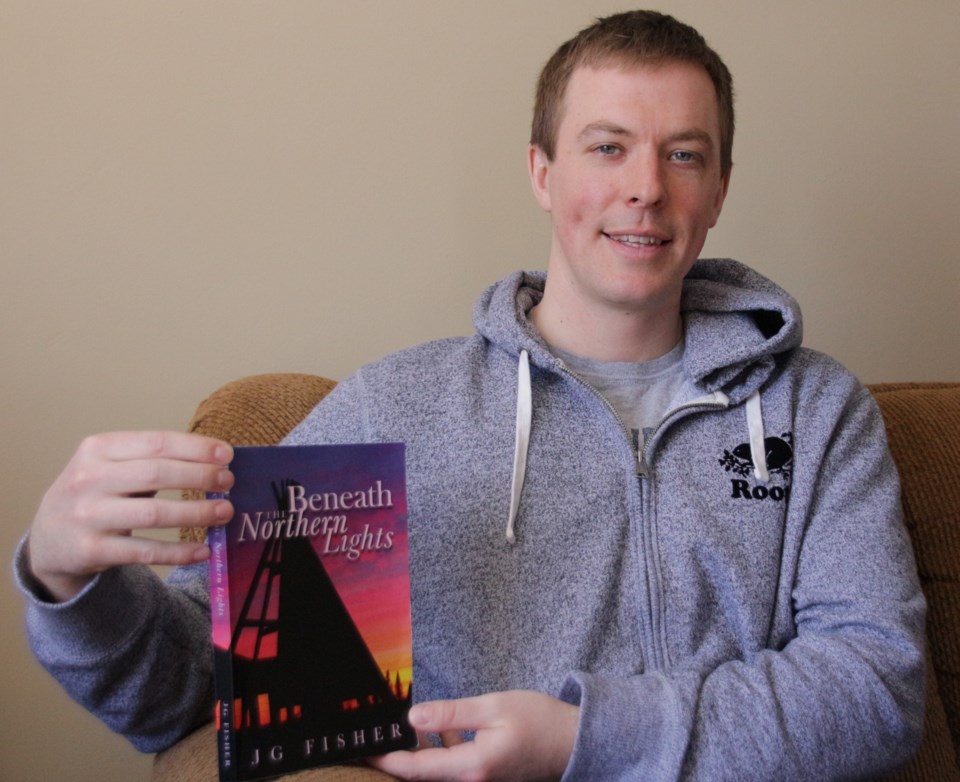Students being bullied and beaten, teen pregnancies, and mental health and addictions issues stemming from an unstable family structure — these are some of the issues that rattled rookie teacher Joey Fisher.
As a young graduate of Lakehead University’s education program in 2012, the Orillia resident was given a chance to go teach at a remote First Nations reserve in James Bay.
Fisher is now presenting what he saw, felt and experienced there during his two years as an elementary school teacher, through his newly published book, Beneath the Northern Lights.
“I knew going into it that I was going to see a different place, but I didn't know it would be as bad as it was,” he said.
“Let’s just say the conditions were not up to par,” Fisher said.
The youth up there are dealing with a lot, he noted.
“Most of them have issues with their families: There's domestic violence and drug abuse,” said Fisher.
“They're still dealing with de-colonizing, but there's a long long way to go. There are no jobs up there and there are false promises all the time and I don't think the state has changed in a long time.”
His first year went by very quickly because things were new.
When he went back for a second year, he had become familiar with the community, but the circumstances surrounding life in the community started to wear him out.
“I was feeling quite depressed,” said Fisher.
So, he decided to journal his feelings and experiences. After coming back to Orillia, he put away the material.
He went back to it a couple years ago to begin sorting through it and to put it together as a book.
Fisher, 29, said he had a difficult time about the project, wondering, 'Do I have the right to tell the story?' The answer he eventually came to was, yes.
“They're Canadians and in my eyes their stories are important and need to be told,” he said. “I think if more people had an understanding of what was going on there, there might be more done about it.”
The story is told through two perspectives, he explained.
“One is a teacher up there and his experiences,” said Fisher. “They're reflections of what I was feeling and seeing."
“The second half is told through Bronwyn's eyes,” he said. “She's a girl who has a really traumatic past and is depressed and doesn't see a way out, so she runs away with an old friend, another boy who grew up on the reserve.”
Fisher said he thinks the strength of the novel is that he is a white guy writing it.
“I'm moved by it and I know it's not right,” he said. “I don't know how we let these types of things happen to people.”
The novel, said Fisher, isn’t commentary on what he thinks should be done or how the residents of the reservation should fix their problems.
“I never say what the solution is; I don't know what the solution is,” he said. “I'm not into politics but I know there's a lot of bullshit in politics: a lot of saying and no doing.”
The leaders in those (remote) communities are going to have to play a really big role, said Fisher.
“But how do we work with them and give them the resources to make it happen?” he asked.
Fisher said his goal with the novel was simply to explain what's going on in the Ojicree First Nation where he lived.
The fictional story doesn’t go deeply into just one issue.
Instead, he chose to focus on missing and murdered aboriginal women and sex trafficking and drug abuse in the northern communities.
And the history of it all ties it together.
“I wanted to look at the factors that might lead to certain choices by the protagonist of the novel,” he said.
The factors include generational trauma and trauma in the whole family structure, which was fractured during colonization.
“Kids who were taken to residential schools and then put back in the community — they didn't know who they were,” said Fisher. “They abused their kids, because guess what, they were abused as kids.”
The novel, he said, is an attempt at painting a general picture of the issues of the community.
All his experiences during the two years weren’t negative. He also spent time learning about and interacting with the community of 800, some of whom were very welcoming, while others not so much.
“Because they think, ‘Here's another white guy who is going to teach for a couple of years and then leave,’” said Fisher.
He said people warmed up to him a bit more when he started getting involved in the community, coaching hockey and doing fundraisers.
He also had a chance to go fishing and connect with nature in the wilderness.
“It's a beautiful place,” said Fisher. “I did really appreciate the nature. I appreciated that they (First Nation) still certainly relied on the land. They lived primarily off hunting and fishing. They'd make bannock and they cut all their wood to heat their homes.”
All staff at the school were welcome to attend community events and traditional ceremonies.
The residents on the reservation appreciates their participation, said Fisher.
“I wanted to tell a story that's very real,” he said. “I'm hoping it bothers some people, because it's supposed to.
“I didn't sugar coat anything,” Fisher said. “It's a tough story. It was tough to write. I don't want to ruffle feathers, but I'm hoping people will have an emotional response and become more aware. I'm hoping it can do some good.”
The book is available on Amazon.



